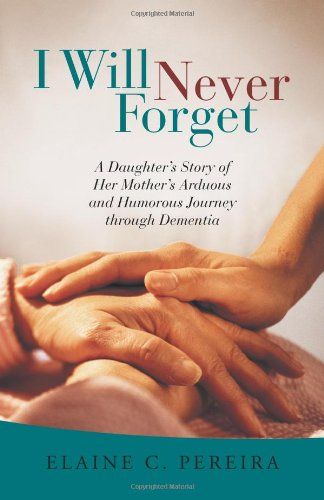
by Elaine C. Pereira
By: Elaine C. Pereira, published by IUniverse, Inc.
I must confess that I am tempted to use certain things about this book, which gave me pause, to withhold our recommendation for this book. However, that would not be fair to the author, who I believe has written a very moving, “from the heart” sketch of what it was like for her to take care of her mother as she journeyed into that “death by inches” she refers to when discussing her dad’s stroke, the indignities (for the victim/patient and the family) of a post-stroke life and his subsequent death. Along the way Ms. Pereira, a physical therapist with a saintly 2nd husband, loses both her brother and his wife to separate heart-rending illnesses, all the while “gaining” that not-to-be wished for “expertise” in eulogies, wills and house sales for the dead or dying.
It is not a story for the weak, but it is a very familiar if not always comforting one for those who have experienced at least some of these life events as caretakers—family or institutional. I very much liked the at-times disconcerting if not confusing--but ultimately very moving--way Ms. Pereira weaved the touching similarities and contrasts between the past and the present in each chapter as her mother descended from normality into the clouds and fog of dementia and ultimately death. I salute her for her courage, tenacity and honesty and the splendid way in which she relates her and her family’s story, warts and all. It is an instructive read in so many ways!
Now, what the book is not. It is NOT, and is not intended to be, a “how-to” book. There are a few good ones out there, such as Coping with Your Difficult Older Parent, by Grace Lebow and Barbara Kane, A Bitter-Sweet Season by Jane Gross and another “journalesque” book, Changing Places by Judy Kramer, all theses and others on our bibliography on this site. The fact is, I take exception with both when and how Ms. Pereira went about finding alternative housing for her mother—in part relying too much on the advice of well-meaning doctors who, like most docs, may find a patient lucid for a short exam period and ill-advisedly based solely thereon go on to recommend housing that is unsuitable and inappropriate due to the unobserved (by the doc) but ever-present (and all too frequently observed directly by family) damning effects of dementia throughout the day and night of each week when, to paraphrase Gordon Lightfoot,” the minutes turn into hours”—long, lonely, frustrating and often exasperating hours.
I also believe, based on the story she tells, that Ms. Pereira may have waited too long to step up her mother out of an independent living environment. Among other things, the stories of her mother’s repeated elopements, ultimately leading to one almost fatal would seem to confirm the understandable but nevertheless potentially dangerous delay. I have defended far too many deaths from elopements to conclude otherwise. And while her statement that “with my professional background as a therapist, I knew firsthand what I should and, equally important, should not see, hear or experience in a quality assisted-living facility” is undoubtedly true, her choice of the next step-up facility, from our perspective, was hardly exhaustive and seemed more driven by convenience—for her mother mostly, perhaps—and finances. Just seems a little odd (based the limited information we have from the book) that she made the decision to keep her mother in the same facility that she was so angry with for the elopements and near death of her mother as she stepped-up her mother to memory care. But only she walked in her own shoes and vicariously those of her mother, so who are we to judge? We certainly won’t and don’t other than to say there are lessons to at least be observed if not learned from these examples of how to approach difficult care decisions for our incapacitated loved ones.
As most stories such as this—those few that are written and published and the thousands that go unwritten and mostly unshared outside of family and close friends—the end of her mother’s life is familiar, moving and tenderly related. Ms. Pereira ends her story by concluding, correctly if we do say so, that “It had been a genuine honor for me to give back to her after she had given so much to me. Just as my mom had said ‘I have no regrets’ about the care she selflessly provided to my dad, I was proud to say that I had no regrets either.” Well then Ms. Pereira, well done; rest easy and proud. Thank you for your story! As the author paraphrases from the Count of Monte Cristo and read, I assume by Ms. Pereira, at her mother’s memorial service in 2011, “The dead are not buried in the ground but in our hearts. They will be there for you when you need them.” This is something that all of us who work especially with the elderly and infirmed should hang onto when it is time to say that final goodbye—our departed loved ones are always with and available to us whenever we need them.